Akhilesh Yadav emerges as challenger in Uttar Pradesh
- Published
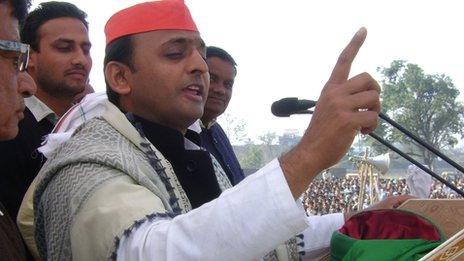
Akhilesh Yadav has been gaining in popularity
With the regional Samajwadi Party emerging as the main challenger to the government of Dalit icon Mayawati in the ongoing assembly elections in India's Uttar Pradesh state, the spotlight is on Akhilesh Yadav, the party's young president who is being credited with its turnaround. The BBC's Geeta Pandey in Lucknow profiles the new star on the politically crucial state's horizon.
A few hundred people have gathered on a winter evening by the roadside in a crowded commercial area in Lucknow.
Overhead hangs red bunting with the smiling faces of party leaders and pictures of a bicycle - their election symbol.
Almost all the men in the crowd sport cloth caps in red - the party colour.
Soon, a bright red bus, escorted by a couple of dozen young men on bikes, comes into view and the crowd gets into a frenzy.
"Long live Akhilesh bhaiyya [brother]," they chant.
The bus comes to a halt in the middle of the road and Mr Yadav is hoisted onto the roof on a mechanical lift.
The member of parliament is the son of Mulayam Singh Yadav - a former wrestler who served three times as the chief minister of Uttar Pradesh.
He is the star campaigner for the Samajwadi Party and the reception he gets here befits a rockstar.
His flag-waving supporters surround the bus and throw rose petals at him. They call out his name and raise their hands to touch him.
Many in the crowd take his photo on their mobile phone cameras.
Mr Yadav appears at ease with the adulation, bending forward to catch the marigold garlands flung at him from below. He knows nearly all the party workers by name and invites a few of them to stand on the bus with him.
'Love people'
His speech is short and lively. He uses humour while listing the failures of the Mayawati government. He pokes fun at her for spending billions of rupees on building parks to Dalit icons and erecting their statues.
"Some people love stone statues, but we love people," he says to loud claps and cheers.
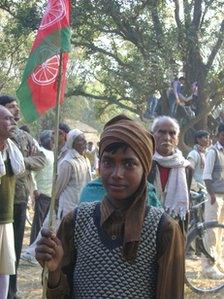
More than 40 million voters in Uttar Pradesh are below the age of 30
He talks about what his party will do if elected: "We will give laptops to students who finish class 12 and tablets to those who complete class 10." His young supporters cheer wildly.
In a country where age is regarded as a sign of wisdom and where most politicians are in their 70s and 80s, Mr Yadav at 38 is rather young.
But he is not new to politics. First elected to parliament in 2000, he is serving his third term as MP.
"Two years ago, he took over as the party president and has been leading the effort to win back power in the state," says Lucknow-based journalist Sanjay Bhatnagar.
"He is spontaneous, he has a presence, he has his own ideas. His father opposed English for being a language of the elite and computers for taking away jobs of poor people.
"But he's a contemporary and educated person. He has contributed a youth flavour to the party manifesto by talking about English and laptops for students."
It's a clever strategy in a state where 40 million voters are below the age of 30.
Mr Bhatnagar says Mr Yadav is being projected as the next leader by the party: "Yadav senior is getting on in years and his health problems are well-known. If the party wins, Akhilesh will be the obvious choice as chief minister."
Litmus test
Comparisons are also being made with Rahul Gandhi, the scion of the Nehru-Gandhi dynasty who is leading India's ruling Congress party's revival bid in the crucial state elections.
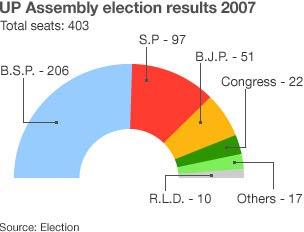
These elections are being seen as a litmus test of their leadership.
Mr Bhatnagar says: "Comparisons with Rahul Gandhi are natural. But Rahul is a national figure, whereas Akhilesh is purely a state leader.
"Rahul is a crowd puller but he is an outsider here. He has an urban image whereas Akhilesh has a more rural image which in Uttar Pradesh is an advantage."
For Mr Yadav though, his main adversary is Ms Mayawati and her Bahujan Samaj Party (BSP).
Since September, when the election campaign went into top gear, he has covered a lot of miles.
"I have travelled 8,000km (4,970 miles) by road and visited more than 250 of the 403 constituencies," he tells the BBC.
Now in the thick of the campaign, he is always on the move. He covers four to five constituencies a day, hopping from one meeting to another in a helicopter.
He offers me a seat in his helicopter during his tour of Ambedkar Nagar - a stronghold of the BSP which won all five seats in the district in the 2007 assembly elections.
We visit four constituencies and at each one he is welcomed by thousands of flag-waving, slogan-shouting supporters.
And his speeches are tailored to address local issues.
'Fed up'
In Jalalpur constituency, he talks about inflation, the problems of farmers and the lack of development: "The government took away all the funds meant for building hospitals and schools for you and spent it on statues."
In Tanda, a town dominated by Muslim weavers, he tells a huge rally: "We will give free electricity to weavers if we are elected."
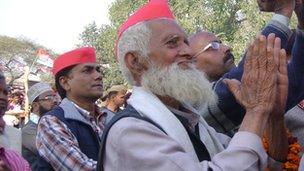
Mr Yadav's rallies have been well attended
Isa Kalim is sold on the promise: "We received a lot of benefits when his father was chief minister. He gave us power at 65 rupees ($1.32; 84 pence) per loom. If they make it free, that will benefit us further."
Later, as we head back to Lucknow, Mr Yadav says: "The people are fed up of bad governance, they want a change."
He is confident his party will return to power. "The government is facing a strong anti-incumbency and that will help us. We will win," he says.
But, analysts say, it's easier said than done. The biggest challenge the party is facing is a negative public perception.
Their earlier stints in power were associated with a surge in gang violence when thugs threatened shopkeepers and harassed women.
"During Mulayam Singh's rule, chain snatchings, thefts were common, people had to pay protection money to goons," says journalist Ashwini Bhatnagar.
"Serious atrocities were committed against Dalits and other low-caste people and memories of those years are very strong in [the] public mind and people fear that petty crimes will go up if the party wins."
It is a perception Mr Yadav is fighting to change.
"We will not shelter or harbour ruffians," he has said. And last month, he stalled controversial politician DP Yadav's attempt to join the Samajwadi party.
But critics point out that many of his party candidates have criminal records and some of them are contesting from inside the jail.
They say that if the Samajwadi Party is elected, it will be back to the old days of muscle-power ruling the state.
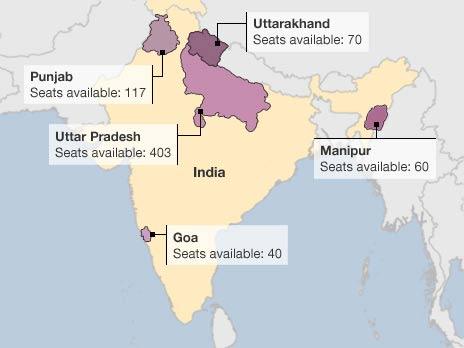
- Published8 February 2012
- Published4 February 2012
- Published26 December 2011
- Published29 December 2011